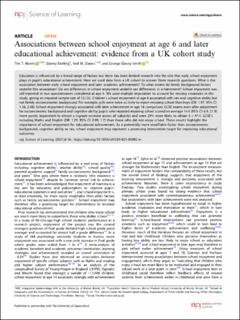| dc.contributor.author | Morris, Tim T. | |
| dc.contributor.author | Dorling, Danny | |
| dc.contributor.author | Davies, Neil Martin | |
| dc.contributor.author | Smith, George Davey | |
| dc.date.accessioned | 2022-12-05T09:48:00Z | |
| dc.date.available | 2022-12-05T09:48:00Z | |
| dc.date.created | 2021-06-24T20:05:05Z | |
| dc.date.issued | 2021 | |
| dc.identifier.citation | npj Science of learning. 2021, 6 (1), 1-9. | en_US |
| dc.identifier.issn | 2056-7936 | |
| dc.identifier.uri | https://hdl.handle.net/11250/3035805 | |
| dc.description.abstract | Education is influenced by a broad range of factors but there has been limited research into the role that early school enjoyment plays in pupil’s educational achievement. Here we used data from a UK cohort to answer three research questions. What is the association between early school enjoyment and later academic achievement? To what extent do family background factors underlie this association? Do sex differences in school enjoyment underlie sex differences in achievement? School enjoyment was self-reported in two questionnaires completed at age 6. We used multiple imputation to account for missing covariates in this study, giving an imputed sample size of 12,135. Children’s school enjoyment at age 6 associated with sex and cognitive ability but not family socioeconomic background. For example, girls were twice as likely to report enjoying school than boys (OR: 1.97; 95% CI: 1.56, 2.48). School enjoyment strongly associated with later achievement in age 16 compulsory GCSE exams even after adjustment for socioeconomic background and cognitive ability; pupils who reported enjoying school scored on average 14.4 (95% CI: 6.9, 21.9) more points (equivalent to almost a 3-grade increase across all subjects) and were 29% more likely to obtain 5 + A*-C GCSE’s including Maths and English (OR: 1.29; 95% CI: 0.99, 1.7) than those who did not enjoy school. These results highlight the importance of school enjoyment for educational achievement. As a potentially more modifiable factor than socioeconomic background, cognitive ability or sex, school enjoyment may represent a promising intervention target for improving educational outcomes. | en_US |
| dc.language.iso | eng | en_US |
| dc.publisher | Springer Nature | en_US |
| dc.rights | Navngivelse 4.0 Internasjonal | * |
| dc.rights.uri | http://creativecommons.org/licenses/by/4.0/deed.no | * |
| dc.title | Associations between school enjoyment at age 6 and later educational achievement: evidence from a UK cohort study | en_US |
| dc.title.alternative | Associations between school enjoyment at age 6 and later educational achievement: evidence from a UK cohort study | en_US |
| dc.type | Peer reviewed | en_US |
| dc.type | Journal article | en_US |
| dc.description.version | publishedVersion | en_US |
| dc.source.pagenumber | 1-9 | en_US |
| dc.source.volume | 6 | en_US |
| dc.source.journal | npj Science of learning | en_US |
| dc.source.issue | 1 | en_US |
| dc.identifier.doi | 10.1038/s41539-021-00092-w | |
| dc.identifier.cristin | 1918290 | |
| cristin.ispublished | true | |
| cristin.fulltext | original | |
| cristin.qualitycode | 1 | |

